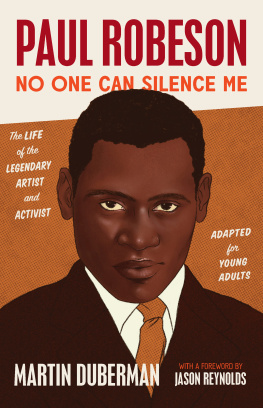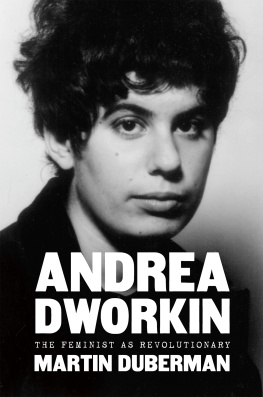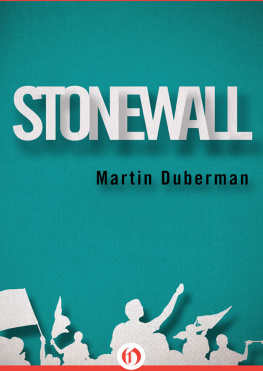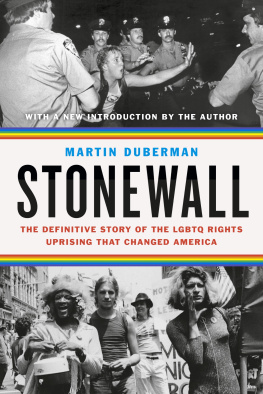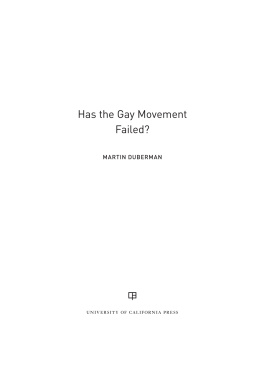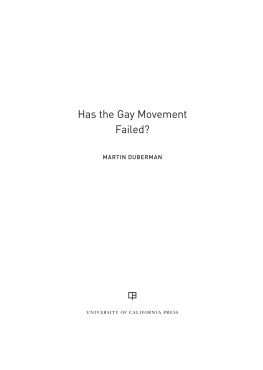The
MARTIN
DUBERMAN
Reader
ALSO BY MARTIN DUBERMAN
NONFICTION
Howard Zinn: A Life on the Left
A Saving Remnant:
The Radical Lives of Barbara Deming and David McReynolds
Waiting to Land
The Worlds of Lincoln Kirstein
Left Out: The Politics of Exclusion: Essays 19642002
Queer Representations (editor)
A Queer World (editor)
Midlife Queer: Autobiography of a Decade, 19711981
Stonewall
Cures: A Gay Mans Odyssey
Hidden from History: Reclaiming the Gay and Lesbian Past (co-editor)
Paul Robeson: A Biography
About Time: Exploring the Gay Past
Black Mountain: An Exploration in Community
The Uncompleted Past
James Russell Lowell
The Antislavery Vanguard (editor)
Charles Francis Adams, 18071886
DRAMA
Radical Acts
Male Armor: Selected Plays, 19681974
The Memory Bank
FICTION
Haymarket
The
MARTIN
DUBERMAN
Reader
The Essential Historical, Biographical,
and Autobiographical Writings
Martin Duberman

NEW YORK
LONDON
2013 by Martin Duberman
All rights reserved.
No part of this book may be reproduced, in any form,
without written permission from the publisher.
Requests for permission to reproduce selections
from this book should be mailed to:
Permissions Department, the new Press,
38 Greene Street, new York, NY 10013.
Published in the united States by the new Press, new York, 2013
Distributed by Perseus Distribution
LIBRARY OF CONGRESS CATALOGING-IN-PUBLICATION DATA
Duberman, Martin B.
[Works. Selections. 2013]
The Martin Duberman reader : the essential historical, biographical, and autobiographical writings / Martin Duberman.
pages cm
ISBN 978-1-59558-890-6 (e-book) 1. Duberman, Martin. 2. United StatesHistory. 3. United StatesSocial conditions. 4. United StatesPolitics and government. 5. Gay rightsUnited StatesHistory. 6. GaysUnited StatesHistory. I. Title.
HQ75.8.D82A25 2013
The New Press publishes books that promote and enrich public discussion and understanding of the issues vital to our democracy and to a more equitable world.
These books are made possible by the enthusiasm of our readers; the support of a committed group of donors, large and small; the collaboration of our many partners in the independent media and the not-for-profit sector; booksellers, who often hand-sell New Press books; librarians; and above all by our authors.
www.thenewpress.com
Composition by dix!
This book was set in Janson Text
2 4 6 8 10 9 7 5 3 1
If the misery of our poor be caused not by the laws of nature, but by our institutions, great is our sin.
Charles Darwin, Voyage of the beagle
To Ellen Adler
my brilliant publisher
my fine friend
Contents
Coda: Acceptance at What Price?
The Gay Movement Reconsidered
To keep this Reader at a reasonable length, Ive omitted the many footnotes that accompanied the original texts. Since those notes often cite archival sources and contain clarifying content, readers interested in confirming my statements should consult the full-length books themselves.
Im grateful to Julie Enszer for her expert advice during the process of cutting down my original manuscript to manageable size, to Maury Botton for shepherding the manuscript through production, and to Ben Woodward of The New Press for fielding my many questions.
In order to preserve the integrity of the historical moment, Ive had to bite my tongue and retain the usage current at the time these pieces were written. Thus, I havent changed Negro to African American or black, nor men to men and women, him to him and her, etc. Its precisely the social movements I write about that subsequently brought about these changes in vocabularywhich is really to say, changes in consciousness. The use of men to cover men and women is especially jarring in the first essay (The Northern Response to Slavery) because so many women were active in the abolitionist movement, and quite a few held leadership positions.
T he abolitionist movement never became the major channel of Northern antislavery sentiment. It remained in 1860 what it had been in 1830: the small but not still voice of radical reform. An important analytical problem thus arises: why did most Northerners who disapproved of slavery become nonextensionists rather than abolitionists? Why did they prefer to attack slavery indirectly, by limiting its spread, rather than directly, by seeking to destroy it wherever it existed?
On a broad level, the answer involves certain traits in our national character. Any radical attack on social problems, suggesting as it would fundamental institutional defects rather than occasional malfunctions, would compromise our engrained patriotism. And so the majority has generally found it necessary to label extreme any measures that call for large-scale readjustment. Our traditional recoil from extremism can be defended. Complex problems, it might be said, require complex solutions, or, to be more precise, complex problems have no solutionsat best, they can be partially adjusted. If even this much is to be possible, the approach must be flexible, piecemeal, pragmatic. Clear-cut blueprints for reform, with their utopian demand for total solutions, intensify rather than ameliorate disorder.
There is much to be said for this defense of the American wayin the abstract. The trouble is that the theory of gradualism and the practice of it have not been the same. Too often Americans have used the gradualist argument as a technique of evasion rather than as a tool for change, not as a way of dealing with difficult problems slowly and carefully but as an excuse for not dealing with them at all. We do not want time for working out our problemswe do not want problems, and we will use the argument of time as a way of not facing them. As a chosen people, we are meant only to have problems that are self-liquidating. All of which is symptomatic of our conviction that history is the story of inevitable progress, that every day in every way we will get better and better whether or not we make any strenuous efforts toward that end.
Next page

